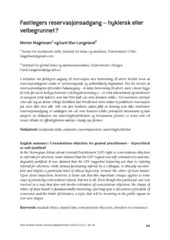| dc.contributor.author | Magelssen, Morten | en_US |
| dc.contributor.author | Langeland, Gard Olav | en_US |
| dc.date.accessioned | 2016-07-07T09:43:58Z | |
| dc.date.available | 2016-07-07T09:43:58Z | |
| dc.date.issued | 2014 | |
| dc.Published | Etikk i praksis 2014, 8(2):69-81 | eng |
| dc.identifier.issn | 1890-4009 | |
| dc.identifier.uri | https://hdl.handle.net/1956/12293 | |
| dc.description.abstract | In the Norwegian debate about General Practitioners’ (GP) right to conscientious objection to referrals for abortion, some claimed that the GPs’ request was self-contradictory and inadequately justified. It was claimed that the GPs’ suggested balancing act, that is, refusing referral for abortion, while instead facilitating referral by a colleague, is ethically inconsistent and implies a particular kind of ethical hypocrisy, termed ‘the ethics of clean hands’. Upon closer inspection, however, it turns out that this important critique applies to some ways of practicing conscientious refusal, but not to all. Even though this particular case was resolved in a way that does not involve toleration of conscientious objection, the charge of ‘ethics of clean hands’ is fundamentally interesting, and may spur a discussion of freedom of conscience and the limits of tolerance, a topic that will be recurring in the public square in ever new shapes. | en_US |
| dc.description.abstract | I debatten om fastlegers adgang til reservasjon mot henvisning til abort hevdet noen at reservasjonslegenes ønske er selvmotsigende og utilstrekkelig begrunnet. Det ble hevdet at reservasjonslegenes foreslåtte balansegang – å nekte henvisning til abort, men i stedet legge til rette for at en kollega henviser («kollegahenvisning») – er etisk inkonsistent og innebærer et særegent etisk hykleri, som har blitt kalt «de rene henders etikk». Ved nærmere ettersyn viser det seg at denne viktige kritikken har brodd mot noen måter å praktisere reservasjon på, men ikke mot alle. Selv om den konkrete saken fikk en løsning som ikke innebærer reservasjonsadgang, er anklagen om «de rene henders etikk» prinsipielt interessant og kan anspore en diskusjon om samvittighetsfrihetens og toleransens grenser, et tema som vil vende tilbake til offentlighetens søkelys i stadig nye former. | en_US |
| dc.language.iso | nob | eng |
| dc.publisher | Programme for Applied Ethics, Department of Philosophy and Religious Studies, Norwegian University of Science and Technology | eng |
| dc.relation.uri | http://tapir.pdc.no/pdf/EIP/2014/2014-02-6.pdf | |
| dc.rights | This work is licensed under a Creative Commons Attribution 4.0 International License. | eng |
| dc.rights.uri | https://creativecommons.org/licenses/by/4.0/ | eng |
| dc.subject | medical ethics | eng |
| dc.subject | natural law | eng |
| dc.subject | conscientious objection | eng |
| dc.subject | freedom of conscience | eng |
| dc.subject | medisinsk etikk | eng |
| dc.subject | naturrett | eng |
| dc.subject | reservasjonsrett | eng |
| dc.subject | samvittighetsfrihet | eng |
| dc.title | Fastlegers reservasjonsadgang – hyklersk eller velbegrunnet? | en_US |
| dc.type | Peer reviewed | |
| dc.type | Journal article | |
| dc.date.updated | 2016-04-11T06:00:11Z | |
| dc.description.version | publishedVersion | en_US |
| dc.rights.holder | Copyright The Author(s). | |
| dc.identifier.doi | https://doi.org/10.5324/eip.v8i2.1852 | |
| dc.identifier.cristin | 1196614 | |
| dc.subject.nsi | VDP::Medisinske fag: 700::Helsefag: 800::Medisinsk/odontologisk etikk, atferdsfag, historie: 805 | |
| dc.subject.nsi | VDP::Midical sciences: 700::Health sciences: 800::Medical/dental ethics, behavioural science, history: 805 | |
| dc.subject.nsi | VDP::Humaniora: 000::Filosofiske fag: 160::Etikk: 164 | en_US |
| dc.subject.nsi | VDP::Medisinske Fag: 700 | en_US |

